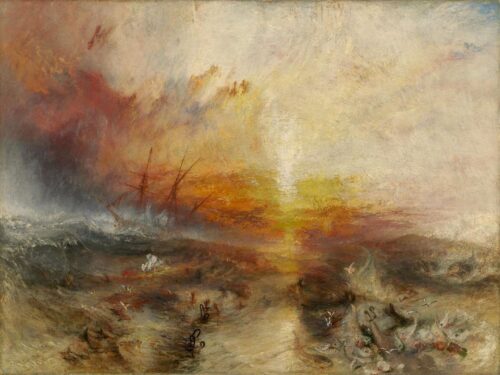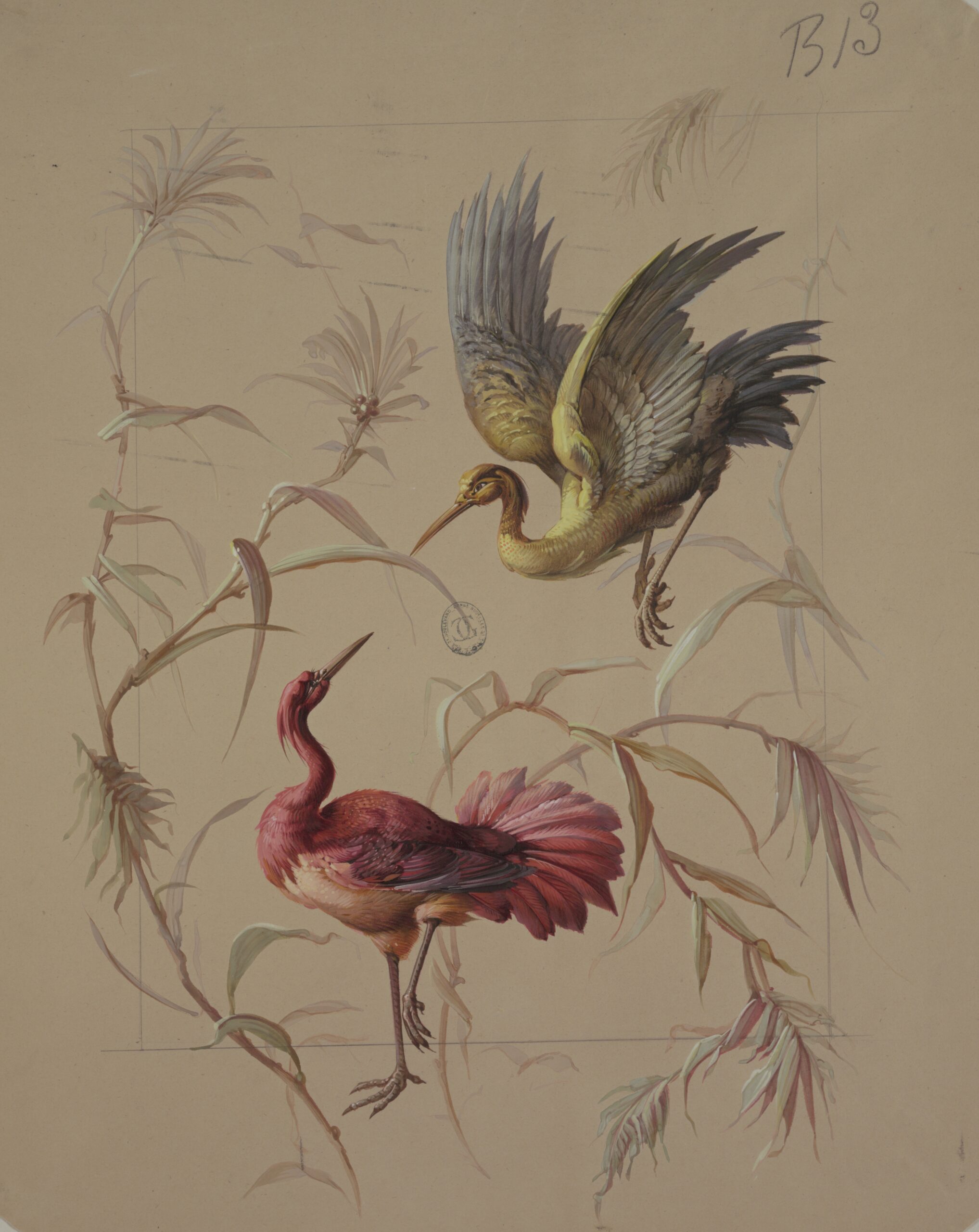
“The Slave Ship” (1840) by J.M.W. Turner (via Wikimedia Commons)
Auntie Ida’s Thanksgiving Blessing
My people are a beautiful
people. We are still here despite
your best efforts. Hear the echo
of our experience.
Our truth grounds us. Our roots
dig deep, searching for magma to
fuel our warmth or to burn those
who expect us to accept their
outdated stance of ignorance.
Guardians of amber, our
ability to accept what
is while creating what will be
proof of our integrity.
My people are a beautiful
people and we know our place
is where we choose it to be.

19th-century design for wallpaper and textile, Creative Commons via Smithsonian Design Museum
Just a Minute
15 June 2020
Yesterday, I saw the blue line take a knee.
While Kaepernick’s maligned and side-lined like the
redlined. His gesture of dissent, snatched, a forced
publicity stunt run on every station.
Take a minute to breathe.
Out of chaos, a shooting star burns out in
atmospheres of fear. Plummets past chores and chance
and stories—26 stories, fallen—
another broken body on our concrete trail.
Take a minute to breathe.
Social feeds serve bodies, bludgeoned and lynched.
Post pokes, keeps the corpse swaying. Likes swarm like flies,
colonize video-fresh flesh.
Take a moment to breathe.
Take another one.
And another, ad infinitum.
A lady of business caught in a low-stakes
game, rakes the Birder, hoping he’ll draw dead. She
plays a racist card then a victim. Terror’s
trill quivering her voice. Drills instilled by the
lady who lied on Emmett Till never die.
Take a minute to breathe.

Model of a slave ship, Collection of the Smithsonian National Museum of African American History and Culture
Author’s note: The following poem includes an embedded message. The hint for deciphering the message is in the title of the poem, placed after the colon. The solution for deciphering the poem’s message can be found in the endnote.[i] (The messages may reflect linguistic variations.)
Olivier LeJeune, First Black Slave in New France:
First of One, Then Second of Two . . .
Some Kirkes snatched a little boy
From the Madagascan shore.
Steeled aboard a naval ship,
Only 7, his past, scorched.
Some Kirkes off-loaded this boy
To the turncoat Le Baillif.
For a mere 50 écus,
Le Baillif’s honour would renew.
Le Baillif now coveted
A rank other than coward.
To prove his worth, he gifted
The boy to Guillaume Couillard.
Guillaume lent the little boy
To Father Le Jeune. The priest
Mocked his innocence, claimed he’d
Groom him into a Christian.
Le Jeune schooled the pint-size boy,
Taught him to read, write, and pray.
Anointed him with water
And the name we know today.
Even at 13 years old
Olivier knew what’s best.
He prayed with one eye on God
And stoked pale, prideful breasts.
Olivier recalled the
Smell of dumplings and fish stew.
Lullabies sung by his mum,
Burnt, lingering residue.
Olivier recounted
In court, notes passed between Nick
Marsolet and Le Baillif.
Nick counter-sued double-quick.
Olivier recanted
His claim. (Nick gerrymandered.)
They threw him in jail: One day
In chains because he’d slandered.
Olivier LeJeune died
In 1654. He
Was thirtyish, just like Christ,
When he slid from human form.
Olivier LeJeune had
A name from his family,
Bristling with ancestral lore, kept
Alive in melodies.
A little boy spent his youth
Shuttled between men. His true
Name marooned on ancestral
Land, like shells the oceans strew.
Note: This poem is part of a larger collection about Black individuals who contributed to Canada between 1604 and 1917.
Work consulted:
Trudel, Marcel. L’esclavage au Canada français: Histoire et conditions de l’esclavage [Slavery in French Canada: The History and Conditions of Slavery]. Québec : Les Presses Universitaires Laval [Laval UP], 1960. Print.
[i] Solution: The poem includes an embedded message or idea. The hint for deciphering the message is placed after the colon of the title of the poem (“Olivier LeJeune, First Black Slave in New France: First of One, Second of Two . . .”).
To decode the message, create a sentence from the first word of Stanza 1, the second word of Stanza 2, the third word of Stanza 3, and so on. Family names in French count as one word.
Message: Some Kirkes coveted little boy Olivier and nick him, like ancestral name.










